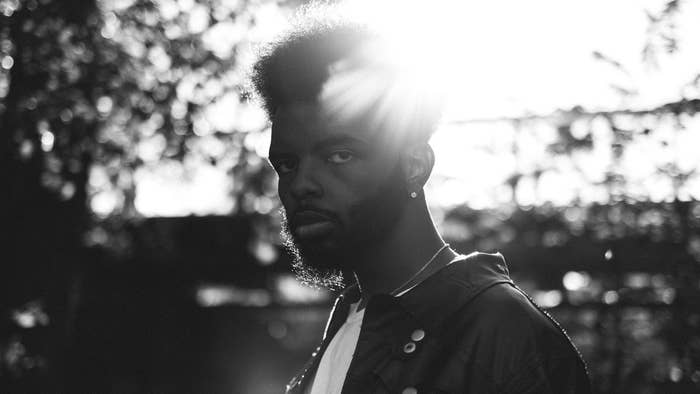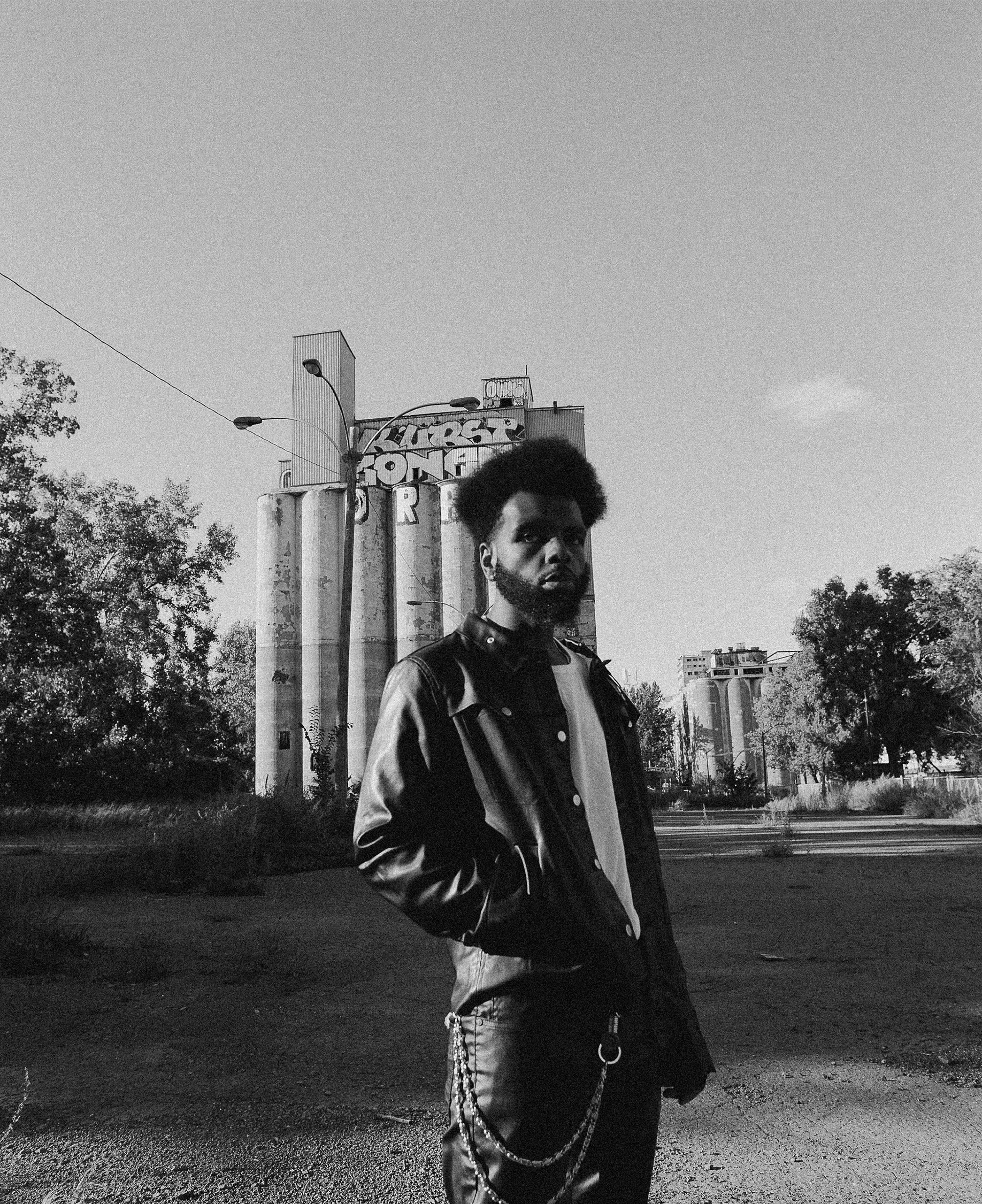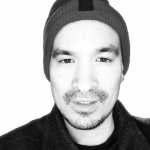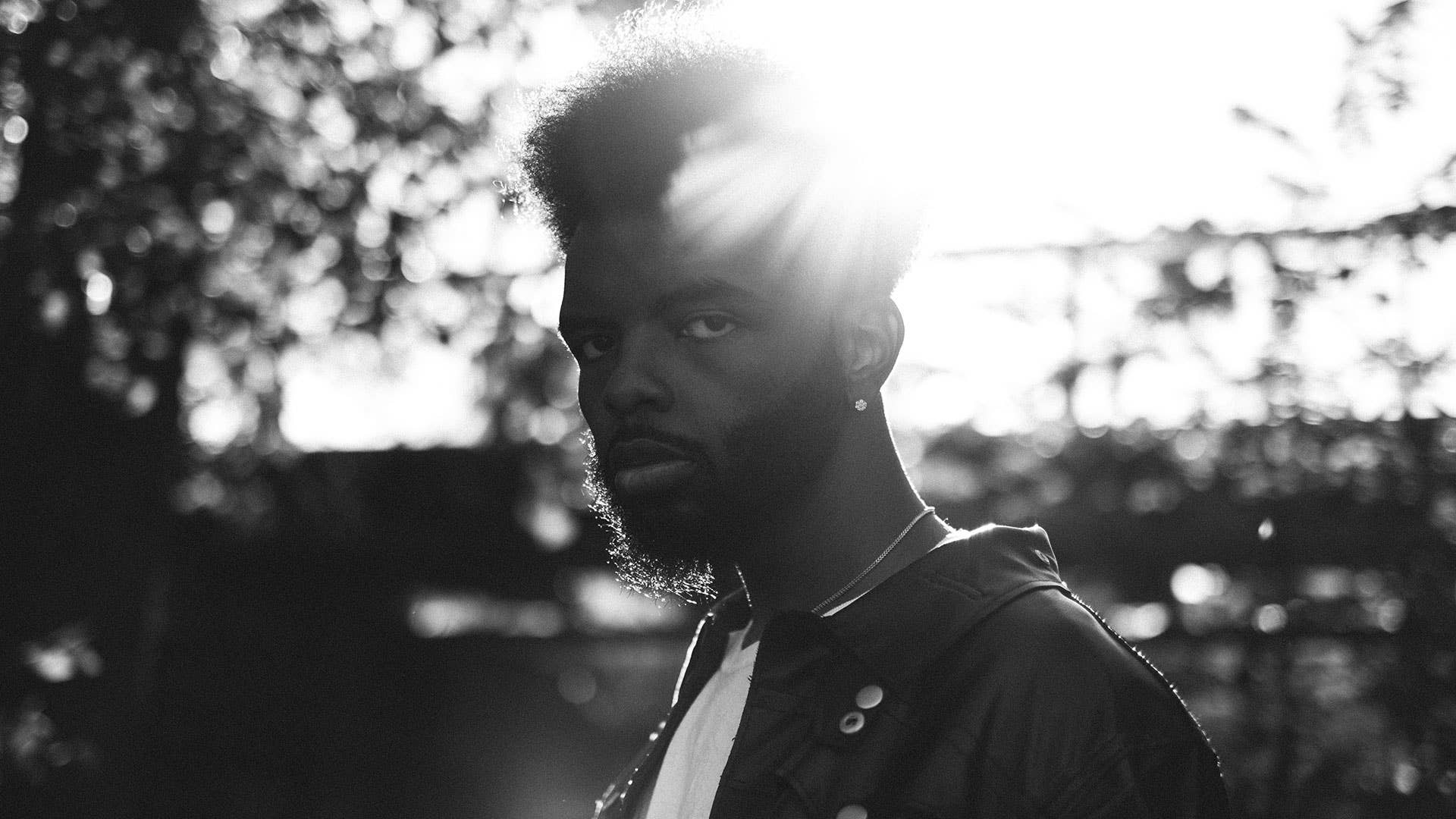
“I make music in my mom’s basement.”
Not only is that phrase plastered on the hoodies of High Klassified’s streetwear label, Laval Ou Rein, it’s something of a mantra for the Quebec producer. After all, mom’s basement is where countless beatmakers crafted their first loops. In Klassified’s case, it’s where he birthed his first platinum-selling smash, Future and The Weeknd’s “Comin Out Strong,” in 2017—and where he still resides today.
“I like showing the world that I still live at home and I have a very good relationship with my family and my parents,” the 28-year-old, born Kevin Vincent, tells Complex Canada. “I’m not ashamed of it.”
“I don’t need, like, big, thousand-dollar speakers and crazy computers or expensive stuff or a crazy studio to build good music. Like, it’s in my mom’s basement, you know? It’s just a little home studio in the suburbs.”
Of course, at least part of the reason he hasn’t flown the Laval coop is the U.S.’ austere work permit restrictions. He was banned from the States for the last five years, due to playing DJ sets in New York without a visa. For a producer looking to ride the momentum of the biggest placement of his career, the inability to travel to L.A. is essentially networking kryptonite.
But now, with the ban freshly lifted, Klassified’s looking to come out ever stronger. When we speak, he’s already in the City of Angels, where he’s been lining up studio sessions with some heavyweights in the rap and R&B space. He couldn’t name any artists on the record except Chicago MC Mick Jenkins, but believe us: It’s shaping up to be a big year for the dude.
“I want to take this as far as I can,” he says.
Not that he wasn’t busy before. The Fool’s Gold signee’s been steadily expanding his musical consciousness the last few years. Over the spring, he dropped a new EP, Law of Automata: Valid, which marries 808s, orchestral RPG atmospheres, and introspective singing from the likes of Zach Zoya and Leven Kali. He’s also coming off a high-profile collaboration with Belgian rap star Damso, crafting a whimsical, piano-driven beat for his track “VIVRE UN PEU.”
And you might’ve caught him in Apple’s latest “Behind the Mac” ad, which celebrates Canadian artists making global noise, from Justin Bieber to Shawn Mendes to Mr. Mom’s Basement himself.
So, you can say Klass is ready for his close-up. He played me a couple beats—built on his Mac during his flight to L.A.—which he plans on showing to the artists he’s meeting while in town. They give a sense of where his compositional head’s at right now: there’s a soothing chill-hop joint anchored by soulful electric piano chords, and an eerie, melancholic drill banger full of wailing synths. You’ll probably hear ‘em on your favourite artist’s next record.
We chatted with High Klassified about his relationship with The Weeknd, his goal of putting Laval on the map, and his next moves.
What brings you to L.A.?
Well, I was banned from the States for five years, because when I was younger I used to play DJ sets with no visa. I used to do a lot of in-and-out in the country; like I would do a lot of small gigs, because I have a friend that owns a bar in New York. And they just thought it was kinda weird that I used to fly weekly there, so they searched my stuff, my phone, and they saw I was DJing with no visa. So then, unfortunately, I got banned, but now I’m finally back. It feels good. I’m pretty much in work mode, but slightly vacation mode also. I’m just trying to make the best out of this trip to link up with people, hopefully have more studio sessions, and also just a little bit of party, you know?
You’re finally free! Congrats. I’m guessing that ever since you broke out with “Coming Out Strong” four years ago, you’ve been dying to go to L.A.
Yes. So, I’ve been working with The Weeknd for probably five or six years now. And we used to work together way more back in the days, because he used to live in Toronto. But now, the fact that he moved to L.A., it was a bit more difficult mutually working through emails and stuff. So, being here, finally I can sit down with artists face-to-face and work with them, because I feel like American artists—I’m not going to say they’re lazy—but with American artists, you really have to sit down with them and show them stuff. Even though you can send them good beats by email, I feel like it’s pretty much an energy thing of being in the same room and sharing this musical connection. So, it feels good to finally be here, sitting down with artists and sharing music. It’s much better than email.
How did you first connect with The Weeknd?
I randomly linked up with The Weeknd because his team sent me an email saying they love what I do and they wanted to work. So I just started by sending him like like two or three beats, just 30-second beat snippets, just to see if there’s a real interest or if it’s actually a real email and it’s really his team. So, the minute I sent him a couple of beats, he followed me on Twitter and IG. And I understood then that it was really his team. After that, I had a show in Toronto with Fool’s Gold, back in like 2015, and I took the time to message them and ask if they wanted to link up because I was in town. So I just ended up having a studio session at Abel’s house and working on some music with him. And from then I just started to build a relationship. He played a show in Montreal and I came to it, and then I started traveling to Toronto more and more. That’s pretty much how everything organically came to life.
“I feel like Abel always finds something good in everything I send him, which is kind of nice. He’s going to try to literally work on the beat, even though it’s not a Weeknd-type beat.”
That’s awesome, man. What’s it like working with Abel?
It’s good. I’m happy with the fact that with pretty much everything I send him, he always finds the good in every beat, you know? Like, some producers are so used to having to [send] a bunch of beats and they don’t really take the time to listen to it properly. But I feel like Abel always finds something good in everything I send him, which is kind of nice. He’s going to try to literally work on the beat, even though it’s not a Weeknd-type beat. He’s always going to try to work to record something to it, you know? So, this is what I really like about working with him.
Dude’s just got an ear for hooks! How about “Comin Out Strong”? How did that one come together?
So, “Comin Out Strong” was just a random beat I produced. It took me so long to make that beat, though, because it’s a beat I did in two parts. And I just randomly sent him the beat thinking he was going to sing on the second part, but he just ended up taking the first part and he made one of his in-house producers add drums to it. I was impressed by the way he visualized it differently than I did. I’m super happy about the final result. And on top of that, there’s Future on the actual beat! So, it was like mind-blowing.
Bro, I wasn’t expecting that they were going to use the beat, because I really sent it during a random period. And they just called me randomly, like two days before Future’s album dropped, to let me know it was going to be on the actual album. My brain couldn’t really process it.

How did having a massive global hit like that change things for you?
I feel like it’s way more easy to work with other artists now, because I have this song in my catalog. It’s way easier for me to work with pretty much whoever I want. Also, I’m happy that they used a kind of complex beat; like, it’s not a basic beat. So, it’s nice that one of my biggest placements is a song that represents my sound pretty well. I’m grateful for that. It gave me the opportunity to work with the biggest artists in Europe, because Europeans love American artists. Like, just knowing that, “Oh, this guy produced for The Weeknd,” they love it. So, I can pretty much work with whoever I want in Europe now.
Who’s an example?
This artist called Damso. He’s like the biggest rapper in Europe right now. He’s a rapper from Belgium. And he just released an album a couple months ago and I had a placement on it. So, yeah, it’s been pretty, pretty crazy since then.
When you’re coming off a huge hit with the biggest pop star in the world, do you feel pressure to keep the momentum going?
Always. It’s my biggest pressure. It’s like you always have to do better and every time a big artist releases something, everybody’s expecting you to be on it. It’s kind of a good pressure because it helps me always stay focused and always try to place more with artists. But it a lot of pressure.
I like that you’ve also kept busy working on your own, more experimental projects, rather than only chasing placements. Your EP Law of Automata: Valid has some really spacey, futuristic vibes. What was your vision for that project?
I really wanted to make the listener feel every feeling, so every song has its own feeling, you know? Like, there is hope, there’s sadness, there’s anger, there’s happiness, there’s love. With Law of Automata, my main goal was pretty much, how can I mix emotions with music? And there’s also a cool video game concept where the whole cover art is a robot version of me. I really wanted to work with a visual artist—the artist’s name is Serwah [Attafuah]. She’s a designer from Australia who I randomly messaged on IG saying, “Hey, I really love what you do. Can you please do your perspective of myself?” I sent a bunch of selfies and pictures and videos of my traits, and she designed 3D video game, PlayStation One version of me. It’s pretty much a big wrap-up of my childhood when I used to play video games and stuff.
What’s your favourite video game soundtrack of all time?
I’d say Final Fantasy VIII has a super dope soundtrack. Also, Xenosaga on PS2. It’s like a Japanese, sci-fi role-playing game. And I’d say Final Fantasy X also. Final Fantasy X has one of the best soundtracks ever.
“I feel like Laval has a really bad rap. Everybody thinks Laval is the city of douchebags, so I’m just here to break all the standards and all the bad feedback about it.”
I know you’ve got a streetwear brand, Laval Ou Rien. I noticed there’s a slogan scrawled all over your shirts: “I make music in my mom’s basement.” Why is that phrase so special to you?
Because I just wanted to give a zone of comfort for young producers, you know? I like showing the world that I still live at home and I have a very good relationship with my family and my parents. I’m not ashamed of it. I like showing the world, like, hey, I produce all my music in my parents’ basement. I built a studio in my mother’s house. I built a studio in my father’s house. And I feel like a lot of producers can relate. It’s not always about having the big studio to make music. You can have the proper tools, a good MacBook, and you can literally make good music out of it, you know? I don’t need, like, big, thousand-dollar speakers and crazy computers or expensive stuff or a crazy studio to build good music. Like, it’s in my mom’s basement, you know? It’s just a little home studio in the suburbs.
Yeah. I’m sure a lot of producers starting out can relate. So, your choice to stay at home, was it just a matter of wanting to keep close to the family and stuff?
Well, I feel like I don’t really need to leave my house right now. Like, I have pretty much all my stuff here and I have a good relationship with my parents. They literally make me feel like we’re like roommates, you know? So I don’t feel the need to leave home right now, even though I’m 28.
Laval Ou Rein. What does that mean to you?
Well, Laval Ou Rien means Laval Or Nothing. I’m from Laval. It’s just like Mississauga; it’s a suburb next to Montreal. I feel like Laval has a really bad rap. Everybody thinks Laval is the city of douchebags, so I’m just here to break all the standards and all the bad feedback about it. So, I just started working on this clothing brand called Laval Ou Rien—it’s just like T-shirts and pieces of clothes that proudly show you’re a proud Laval resident, but also Montreal people can wear it, you know? There’s no discrimination. It’s a clothing brand that worships this beautiful city of Laval, because I’m a proud Laval resident. It’s been going for like six, seven years, and now we’re working on another collection. But this collection is going to be more high fashion ish, like better quality than the previous ones.
Interesting. I didn’t realize Laval was seen as such a douche town. [Laughs.]
Yeah, yeah. Laval has a bad rap because they think that Laval is the city of the gym and shit. So they think there’s only douchbags there. But not everybody knows about it. There’s like a big, big Haitian community in Laval. So yeah, not only douchebags.
Who are some other Laval artists the world needs to know?
Well, a bunch of French rappers from Montreal are actually from Laval. There’s this artist called Tizzo, this artist called Shreez. There’s also this producer that’s from the North Shore named Da-P. That’s my homie, I’m actually with him in L.A. right now. And there’s this other producer called Ruff Sound. He’s a pretty big producer in the French-Canadian scene right now. He’s producing for most of the French-Canadian artists.
That’s dope. The last five years or so, there’s been this wave of beatmakers from Montreal with a Haitian background. There’s you, there’s Kaytra, there’s Lunice, there’s Shash’U. You’ve all been dominating the scene. Talk about that movement. How do you explain it?
I feel like the Haitian community in Montreal is pretty big. There’s a lot of Haitian people and the Haitian influence is big in Montreal, too. Like, the way we speak French, now everybody—you could be Haitian, Black, white, Asian, or Latino—uses like Haitian creole words in their French. I feel like the Haitian community is pretty respected in Montreal. So, just the fact that we’re all Haitians working together and stuff is just influential. And as Haitian people, also, we really love music. So it’s just accurate, you know?
Yeah, totally. I’ve heard that there’s a lot of Haitian creole incorporated into Quebecois slang. Do we hear the Haitian influence in the beats themselves? Like, in the music?
Hmm, not necessarily. Well, I mean, a lot of producers like Kaytra, Shash’U, Lunice, and even I, we have that bounce in our music. It’s a good bounce for beats. I feel like this bounce is pretty much a part of our Haitian roots, you know? Just like aiming to make people dance and not really respecting the standards of rhythm, and just creating our own rhythm—I feel like that has something to do with the Haitian influence, of course.

What’s influencing the stuff you’re currently working on? Is it still sci-fi and video games, or is it something else?
That’s a good question. I don’t know yet. I’m really into bossa nova right now. It’s like Brazilian jazz; I feel like I want to be more on that side right now. I love more acoustic Brazilian vibes and stuff. I love elevator music.
You’ve gotta start spending more time in elevators for inspiration.
[Laughs.] Yeah, I have to.
Right now, I’m in a phase where I pretty much focus on creating the most beautiful melodies possible. And now, since there’s the pandemic, I try to work outside more, because I feel like I’m always stuck at home, either playing video games, working out, or making beats. So I make a bunch of sound banks so I can just work outside and I don’t need to bring my whole big keyboard with me to play chords. I just do the rest on my laptop. I feel like the fact that I produce more and more outside just makes me add some more nature sounds to my music. So, I’m always adding like a bird chirping or crickets and stuff. It just inspires me.
What’s next for you?
I’m pretty much into being a better producer every day, so I’m trying to focus more on my musical ear. I’m taking piano classes. I’m still working with the major artists, but I’m also trying to be a better producer and learning more about the music theory. I want to produce more different stuff and not be too comfortable in where I am right now. I feel like my next project is going to be way more musical and soulful. So, this is what I’m on. I’m more in a self-growth mode right now.




